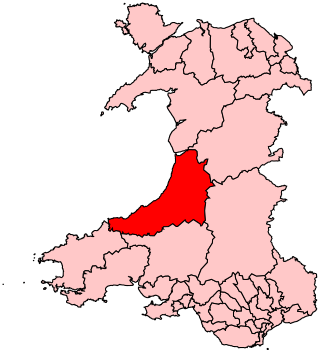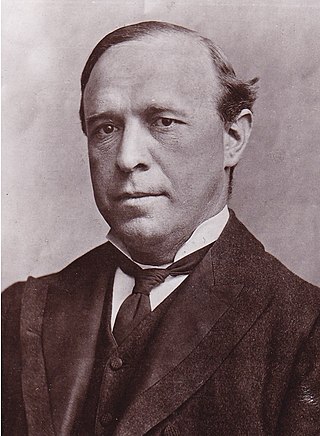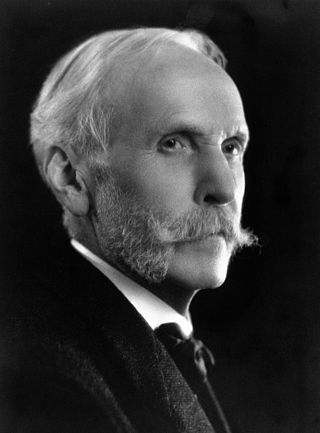Related Research Articles

David Davies was a Welsh industrialist and Liberal politician who sat in the House of Commons between 1874 and 1886. Davies was often known as David Davies Llandinam. He is best remembered today for founding Barry Docks.

Ceredigion was a parliamentary constituency represented in the House of Commons of the UK Parliament. Created in 1536, the franchise expanded in the late 19th century and on the enfranchisement of women. Its boundaries remained virtually unchanged until 1983. From 1536 until 1885 the area had two seats : a county constituency (Cardiganshire) comprising the rural areas, the other the borough constituency known as the Cardigan District of Boroughs comprising a few separate towns; in 1885 the latter was abolished, its towns and electors incorporated into the former, reduced to one MP. The towns which comprised the Boroughs varied slightly over this long period, but primarily consisted of Cardigan, Aberystwyth, Lampeter and Adpar, the latter now a suburb of Newcastle Emlyn across the Teifi, in Carmarthenshire.
William Bowen Rowlands, was a British politician and Member of Parliament.

William Llewelyn Williams known as Llewelyn Williams, was a Welsh journalist, lawyer and radical Liberal Party politician.

Matthew Lewis Vaughan-Davies, 1st Baron Ystwyth was a Welsh Liberal Party politician. He was Liberal MP for the Cardiganshire Division from 1895 until 1921.
The 1921 Cardiganshire by-election was a parliamentary by-election held for the British House of Commons constituency of Cardiganshire on 18 February 1921. The election was important for the bitterness of the contest between the Coalition and Independent factions within the Liberal Party and the deepening of this division within the party as a factor in the long-term decline of Liberalism in Wales.

Sir Abraham Garrod Thomas was a Welsh physician, philanthropist, magistrate, politician and Member of Parliament.
The first election to the Cardiganshre County Council was held in January 1889. It was followed by the 1892 election. The county was divided into numerous single member wards with two councillors elected to represent Cardigan, Lampeter, New Quay and Llandysul, and four to represent the town of Aberystwyth. 37 Liberals, 10 Conservatives and 1 Unionist were returned.
The third election to the Cardiganshire County Council took place in March 1895. It was preceded by the 1892 election and followed by the 1898 election
The fourth election for Cardiganshire County Council took place in March 1898. They were preceded by the 1895 election and followed by the 1901 election
The fifth election for Cardiganshire County Council took place in March 1901. They were preceded by the 1898 election and followed by the 1904 election
The sixth election for Cardiganshire County Council took place in March 1904. They were preceded by the 1901 election and followed by the 1907 election
The seventh election for Cardiganshire County Council took place in March 1907. They were preceded by the 1904 election and followed by the 1910 election
The ninth election for Cardiganshire County Council took place in March 1913. They were preceded by the 1910 election and followed by the 1919 election as no election took place in 1916 due to the First World War.
The tenth elections for Cardiganshire County Council took place in March 1919. They were preceded by the 1913 election and followed by the 1922 election. No election took place in 1916 due to the First World War.
Thomas Edward Lloyd was a British Conservative Party politician. He was Conservative MP for Cardiganshire from 1874 to 1880.

Evan Matthew Richards was a Welsh Liberal politician who represented Cardiganshire in the British House of Commons from 1868 until his defeat at the general election of 1874.
The eleventh election to Cardiganshire County Council took place in March 1922. It was preceded by the 1919 election and followed by the 1925 election.
The twelfth election to Cardiganshire County Council took place in March 1925. It was preceded by the 1922 election and followed by the 1928 election. While the previous election had been held in the shadow of bitter Liberal infighting at parliamentary level, the temperature had cooled and only ten seats were contested.
The fifteenth election to Cardiganshire County Council took place in March 1934. It was preceded by the 1931 election and followed by the 1937 election.
References
- 1 2 "Marriage of Mr J.M. Howell and Miss Evans". Cambrian News. 20 June 1890. Retrieved 3 December 2013.
- ↑ Morgan. "Cardiganshire Politics": 319.
{{cite journal}}: Cite journal requires|journal=(help) - ↑ Morgan. "Cardiganshire Politics": 311.
{{cite journal}}: Cite journal requires|journal=(help) - ↑ Morgan. "Cardiganshire Politics": 332–3.
{{cite journal}}: Cite journal requires|journal=(help)